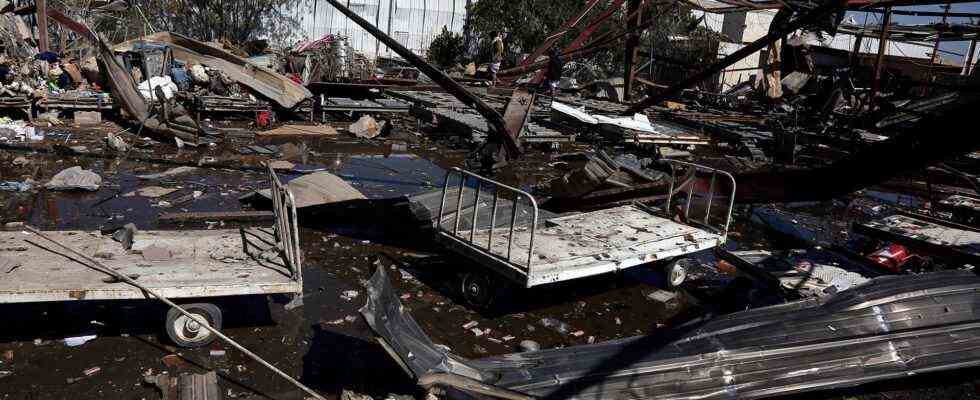Status: 12/22/2021 3:47 p.m.
The civil war is raging in Yemen and the situation is devastating: children are starving to death, civilians are struggling to survive. Now the UN World Food Program has announced that it will have to cut its aid due to a lack of funds.
If the kids can still scream, it’s a good sign. Many fell silent. With oversized eyes, sunken faces, arms thin as pencils, the toddlers lie quietly in their cots. They no longer have the strength to cry and are artificially fed – if they can be helped at all. Reuters news agency images from a hospital in Yemen make it clear who is hit hardest by the famine.
“We just want the war to end,” says the desperate father of a malnourished girl. “Then I can find work again and feed my family so that my children can live. If the situation continues as before, then we will all die.”
Medical care largely collapsed
The hospital in Hodeidha, where his daughter lies, is completely overcrowded, and medical care in Yemen has largely collapsed. The clinic director no longer knows where to put the children. “The malnourished ward is full,” he says. The emergency room is already being used to treat the malnourished children.
“What particularly upsets me as a mother is that half of the children under the age of five have such stunted growth that it cannot be reversed,” says Christa Rottensteiner on the phone. She heads the International Organization for Migration (IOM) in Yemen. “That means they will not be able to catch up mentally or physically. This is really a lost generation.”
The humanitarian situation is getting worse
“The humanitarian situation is getting worse,” said Rottensteiner. “There are 20 million people in need of help – that’s two-thirds of the population. After so many years of war, the economy is really down, and much of the country is inflationary. That means that while there is food, it is. This is what it is.” but have become unaffordable for most people. “
But there is no end to the war in sight – also because it is being fueled more and more from outside. In Yemen, Houthi rebels are fighting against supporters of the government of President Abdrabbo Mansour Hadi, who has fled into exile. Saudi Arabia supports the Hadi supporters with air bombing. The Houthi rebels, in turn, receive aid from Iran. Observers call this a proxy war – Iran and Saudi Arabia are vying for supremacy in the region.
Civilians are struggling to survive
Separatists have split off in the south, the United Arab Emirates have a hand in it, and the terrorist organization Al-Qaeda is also represented in the country – Yemen has become the plaything of international interests. Right in the middle of it all are the civilians – they are all about survival. “I am extremely alarmed about the ongoing fighting. The conflict is escalating. A new chapter in the Yemen war threatens that will be even more bloody than before,” says the United Nations special envoy for Yemen, Hans Grundberg.
No more aid supplies from the air to Sanaa
Relief supplies are now very difficult to reach – and the situation has now deteriorated again: The airport in the capital Sanaa was bombed and destroyed by Saudi Arabia – it means that aid supplies can no longer be flown in from the air.
The Saudis justify themselves – they wanted to create peace with the bombing: “The reason for the attack on the airport was that we tried to exert pressure through the international community so that the Houthis would choose peace,” argues Salem Al Yami , a former advisor to the Saudi Foreign Ministry.
Fierce battle for oil fields
But the Houthis oppose this: “We are forced to continue this war,” said Mohamed Al Bukheity, a member of the Houthi Politburo. “We are countering the escalation with a counter-escalation. If God wills, we will stop the aggression, repel the enemies and break the blockade. In Yemen we are in the process of conquering our oil fields. That will be the liberation.”
The oil fields are located in the north of Yemen in the Marib region. A bitter battle is currently raging there – the city is considered strategically crucial. Marib is the last stronghold of the Hadi government in the north, losing it would be a major defeat. The city has been under constant fire for months, with the Saudi alliance bombing from the air. Here, too, the civilians suffer: Again and again they have to fly out of refugee camps and move on because the fronts are shifting.
UN faced with “difficult decisions”
And the aid money from the United Nations has decreased significantly this year. “The Corona crisis means that many countries no longer have the funds,” explains Rottenheimer. “This year the United Nations only got 50 percent of what we need. And that means we have to make very difficult decisions about who we can help and who we can’t help.”
The United Nations speaks in Yemen of the greatest humanitarian crisis of our time. Whether the starving children of Yemen will be able to rebuild their country at some point – there is little hope at the moment.
Today the United Nations World Food Program (WFP) announced that it would cut its aid to those in need in the civil war country. Due to a lack of funds, eight million people would receive smaller food rations from January, according to the WFP. Five million people should continue to receive the full ration. These are in immediate danger of slipping into famine. Without additional aid, further cuts will soon be inevitable. The WFP’s food supplies are dangerously low.
Displaced conflicts: the situation in Yemen is coming to a head
Anna Osius, ARD Cairo, December 22nd, 2021 1:38 p.m.

